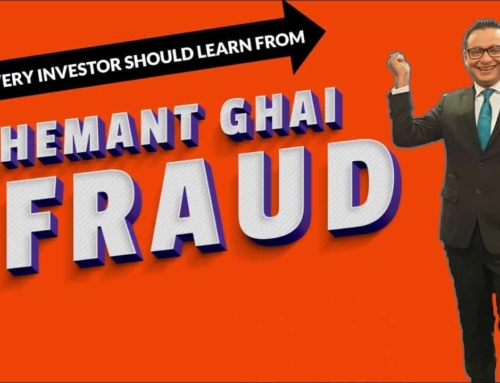Hemant Ghai (CNBC Host) Scandal
Who is Hemant Ghai?
Hemant Ghai is the former stock editor at Network 18’s, CNBC Awaaz channel. Hemant was hosting many shows in the CNBC Awaaz like Stocks 20-20, Pehla Sauda, Munafe Ki Taiyari and Kamai ka Adda.
But his main role was in the Stock 20-20 show which aired at the morning time. The show recommended certain stocks to be bought or sold during the day. As the name of the shows suggest, it was basically focusing on the money-making tricks and strategies which retail users can use to gain profits.
What did he do?
The whole story of his fraud was planted from the show “Stock 20-20”, where he used to recommend certain stocks to his viewers, to be bought or sold during the day. Ghai used his mother’s trading account and his wife’s trading account to manipulate and directly or indirectly used it for his own advantage.
Since he was aware of the stocks to be recommended in the morning show, he would buy/ sell those particular stocks a day prior to the show. He used his wife’s and his mother’s trading account to do so. And on the same day of recommendation, he would again sell/ buy those stocks to make his profits.
Owing to the fact that this show had a great TRP, viewership and many retail users took decisions on the basis of the recommendation made by the experts. And it was working well for him, until it came to the notice of the SEBI.
This is a pure story of an insider trading, where he was also following the pump and dump policy to make profits. This was no different from the tricks followed by Harshad Mehta in the 90’s. He undertook a large number of Buy – Today – Sell – Tomorrow (BTST) trades during the 5 months of the relevant period. He was buying the stocks at low prices and the retail users bought the same at a high price after his recommendation.
He booked his profit by selling those stocks on the same day. According to the rules and regulations, one cannot do trading on the same stocks which they recommend during a show or they cannot suggest those stocks which are already present in their account.
SEBI took strong action
SEBI banned Hemant Ghai, his wife Jaya Hemant Ghai and his mother Shyam Mohini Ghai from trading into the stock exchange till further notice. SEBI order points out that Ghai made a profit of Rs 2.95 crore, just through the limited number of trades examined during the relevant period.
When a proper analysis was conducted on the trading pattern in the trading account of Jaya Hemant Ghai and Shyam Mohini Ghai for the period between January 1, 2019, and May 31, 2020, high correlation of their trades was observed with the stocks recommended in the show. It was almost 80% the same stocks that were recommended during the show Stock 20-20.
SEBI found that shares were consistently purchased in the trading accounts of Hemant Ghai’s wife and mother, one day prior to the day of recommendation on the show. It was found out during the investigation that almost 75 scripts were those that were recommended during the show. To name, Aptech Ltd, JK Paper, NIIT Ltd, BEML and Andhra Bank were among those that were traded during that period. This activity was the violation of the provisions of SEBI’s PFUTP (Prohibition of Fraudulent and Unfair Trade Practices) Regulations.
What next?
Though he may not be jailed, he along with his family members can be banned from trading till the investigation continues further. It’s not a matter of only CNBC Awaaz shows, there are many more shows running on the same concept of suggestion and recommendation of trade. There needs to be a check on all those channels or shows to ensure fair and legal practices to be followed in terms of trading.
The system should be strong enough to protect the interest of the retail users being trapped and lose money through such fraudulent behavior. A proper check and balance has to be established to protect the vested interest of the users, as in general retail traders trust and make their investment decision based on such shows and follow the trends and tricks recommended in the TV shows and other media platforms.
According to the SEBI, this kind of fraudster behaviour also affects the development of the securities market, as investors tend to lose faith in the securities market particularly by persons with large following in the media.
Hemant Ghai (CNBC Host) Scandal
Who is Hemant Ghai?
Hemant Ghai is the former stock editor at Network 18’s, CNBC Awaaz channel. Hemant was hosting many shows in the CNBC Awaaz like Stocks 20-20, Pehla Sauda, Munafe Ki Taiyari and Kamai ka Adda.
But his main role was in the Stock 20-20 show which aired at the morning time. The show recommended certain stocks to be bought or sold during the day. As the name of the shows suggest, it was basically focusing on the money-making tricks and strategies which retail users can use to gain profits.
What did he do?
The whole story of his fraud was planted from the show “Stock 20-20”, where he used to recommend certain stocks to his viewers, to be bought or sold during the day. Ghai used his mother’s trading account and his wife’s trading account to manipulate and directly or indirectly used it for his own advantage.
Since he was aware of the stocks to be recommended in the morning show, he would buy/ sell those particular stocks a day prior to the show. He used his wife’s and his mother’s trading account to do so. And on the same day of recommendation, he would again sell/ buy those stocks to make his profits.
Owing to the fact that this show had a great TRP, viewership and many retail users took decisions on the basis of the recommendation made by the experts. And it was working well for him, until it came to the notice of the SEBI.
This is a pure story of an insider trading, where he was also following the pump and dump policy to make profits. This was no different from the tricks followed by Harshad Mehta in the 90’s. He undertook a large number of Buy – Today – Sell – Tomorrow (BTST) trades during the 5 months of the relevant period. He was buying the stocks at low prices and the retail users bought the same at a high price after his recommendation.
He booked his profit by selling those stocks on the same day. According to the rules and regulations, one cannot do trading on the same stocks which they recommend during a show or they cannot suggest those stocks which are already present in their account.
SEBI took strong action
SEBI banned Hemant Ghai, his wife Jaya Hemant Ghai and his mother Shyam Mohini Ghai from trading into the stock exchange till further notice. SEBI order points out that Ghai made a profit of Rs 2.95 crore, just through the limited number of trades examined during the relevant period.
When a proper analysis was conducted on the trading pattern in the trading account of Jaya Hemant Ghai and Shyam Mohini Ghai for the period between January 1, 2019, and May 31, 2020, high correlation of their trades was observed with the stocks recommended in the show. It was almost 80% the same stocks that were recommended during the show Stock 20-20.
SEBI found that shares were consistently purchased in the trading accounts of Hemant Ghai’s wife and mother, one day prior to the day of recommendation on the show. It was found out during the investigation that almost 75 scripts were those that were recommended during the show. To name, Aptech Ltd, JK Paper, NIIT Ltd, BEML and Andhra Bank were among those that were traded during that period. This activity was the violation of the provisions of SEBI’s PFUTP (Prohibition of Fraudulent and Unfair Trade Practices) Regulations.
What next?
Though he may not be jailed, he along with his family members can be banned from trading till the investigation continues further. It’s not a matter of only CNBC Awaaz shows, there are many more shows running on the same concept of suggestion and recommendation of trade. There needs to be a check on all those channels or shows to ensure fair and legal practices to be followed in terms of trading.
The system should be strong enough to protect the interest of the retail users being trapped and lose money through such fraudulent behavior. A proper check and balance has to be established to protect the vested interest of the users, as in general retail traders trust and make their investment decision based on such shows and follow the trends and tricks recommended in the TV shows and other media platforms.
According to the SEBI, this kind of fraudster behaviour also affects the development of the securities market, as investors tend to lose faith in the securities market particularly by persons with large following in the media.










Leave A Comment